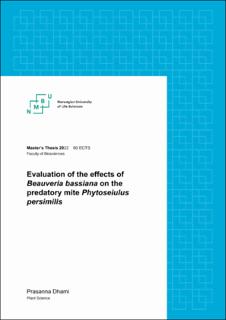Evaluation of the effects of Beauveria bassiana on the predatory mite Phytoseiulus persimilis
Master thesis
Permanent lenke
https://hdl.handle.net/11250/3021726Utgivelsesdato
2022Metadata
Vis full innførselSamlinger
- Master's theses (IPV) [240]
Sammendrag
The entomopathogenic fungus Beauveria bassiana (Balsamo) and the predatory mite Phytoseiulus persimilis are effective biological control agents of Tetranychus urticae (Acari: Tetranychidae), an economically important pest of greenhouse vegetables, horticultural and ornamental crops worldwide. To evaluate whether B. bassiana may affect P. persimilis negatively, P. persimilis mortality, fecundity and T. urticae preying capacity exposed to the lowest and highest recommended dose of a commercial formulation of the B. bassiana strain GHA at three different temperatures (15, 20 and 25 C) and 95% RH were evaluated in a detached leaf disk assay and potted plant assay. Adult P. persimilis was infected by B. bassiana in leaf disk assay and potted plant assay where 100% mortality was reached in 12 days at 20 °C and 25 °C in both assays. However, only 75% mortality was recorded in 12 days of the experiment at 15 °C. There was significant difference between 100% and 75% mortality at 0.05 significance level. Furthermore, the number of eggs laid by P. persimilis and T. urticae eaten by P. persimilis in four days was also affected at 0.05 significance level. The current study shows that B. bassiana has significant effect on the survival, egg laying and feeding capacity of P. persimilis.

